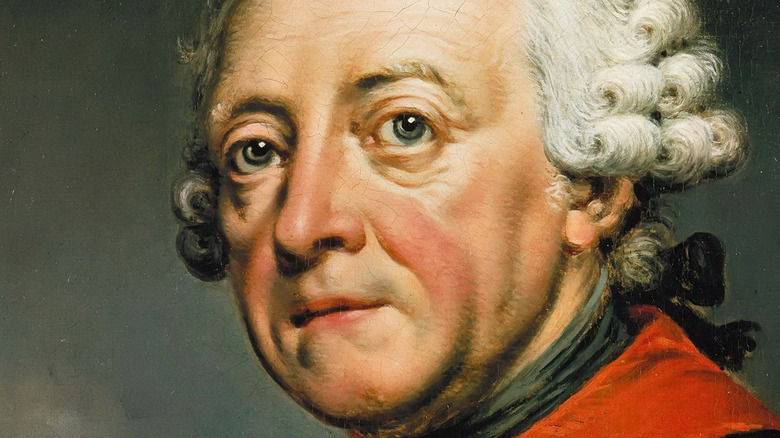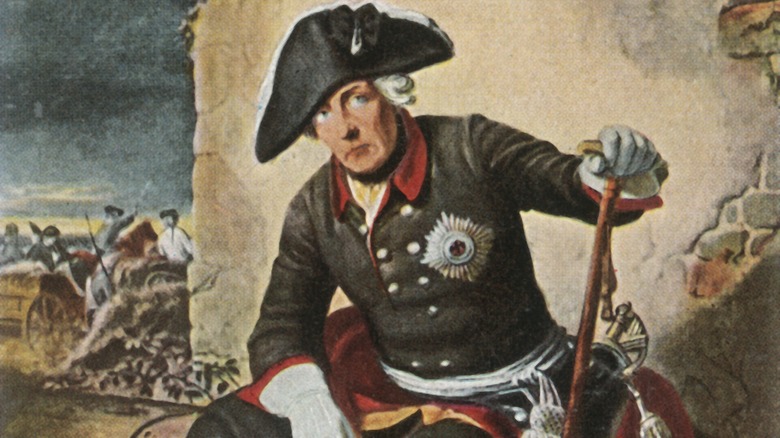The Strange Reason Frederick The Great Banned Coffee In Prussia
The year is 1779; the place, Berlin, or Magdeburg. It's a cold morning. Laborers are just leaving the house for work.
Through your window, you notice a suspicious-looking man with a limp, wrapped up in a black Prussian military cloak, slinking by open windows. He appears to be ... smelling something? Sniffing the air? You see him sidle up to the window of a tavern. He smells. Then he whistles. In a minute, armed gendarmes are running down the street and forcing the door. Minutes later they carry out the patron, still clutching a steaming coffee pot.
That sounds like a fairly campy bit of historical fiction, but it's not. As Mental Floss recounts, Frederick the Great (pictured), the celebrated king of Prussia and master of war, really did hire a police force of 400 "sniffers," mostly disabled veterans, to wander the streets of his cities, sniffing out what Frederick considered an unhealthy, unpatriotic vice: coffee.
Our morning vice
Coffee is so thoroughly integrated into our lives that it's strange to think it was considered a dangerous drug for centuries (per Mental Floss), even in the countries that would later become famous for their love of the stuff. In 1511 it was banned in the Arabian city of Mecca, near the port of Mocha, home to the arabica bean. Apparently, enemies of the sherif were discussing dangerous ideas over their bowls of coffee. The 17th century Ottoman sultan, Murad IV, was so convinced of coffee's evil that he ordered imbibers beaten, and second-time offenders drowned. (Yet who today hasn't heard of or sampled Turkish coffee?)
Frederick the Great would take the throne of Prussia, one of the states that preceded a united Germany, in 1740 (via Britannica). Famously fussy and conservative, the soldier-king saw coffee as a foreign vice, a competitor to the natural, healthy drink of the German people, beer. Worse, it was a fiscal threat. "At least 700,000 thaler leave the country annually just for coffee," Frederick was alleged to have complained. In the mercantilist economy of the 18th century (also via Britannica), imports were a weakness. Money in, good; money out, bad.
A boiling conscience
Frederick never entirely banned coffee: he required would-be roasters and servers to apply for a license, which he made sure was hard to obtain. But the appetite for coffee in the 18th century was massive, even in Prussia, and when Frederick died in 1786 his successor cancelled the coffee laws.
Frederick's attempt to ban coffee bore the stamp of his character. Like his abusive, unloving father, Frederick saw himself as a soldier above all things: tough, plainspoken, and obsessed with discipline. But his inner life was a constant turmoil. He really did like the pleasures of life, sensual or frivolous as they may be; he was, for example, a committed Francophile who named his palace in Potsdam "Sanssouci," French for "without a care." As a boy, his father considered him effeminate, and (per Britannica) ordered the execution of Frederick's best friend (and likely boyfriend) in front of the weeping future king. The boy who loved beautiful things and palaces "without a care" swallowed those former joys when he took up the crown. He forced himself into the mold his father had set, and while it brought him enormous success as a leader, it must have cost him enormously to keep his secret self suppressed. Every pleasure is suspicious to a man like that: An innocent cup of coffee can look like a sin.


